Key takeaways:
- Grief counseling offers a safe space for individuals to process emotions and understand that grieving is not linear.
- The importance of hospital ministry lies in providing emotional support and fostering spiritual connections during difficult times.
- Counselors not only listen but also help clients develop coping strategies, reinforcing community among those experiencing similar losses.
- Grieving can coexist with joy, emphasizing the value of creating personal rituals to honor memories while allowing for the experience of happiness.
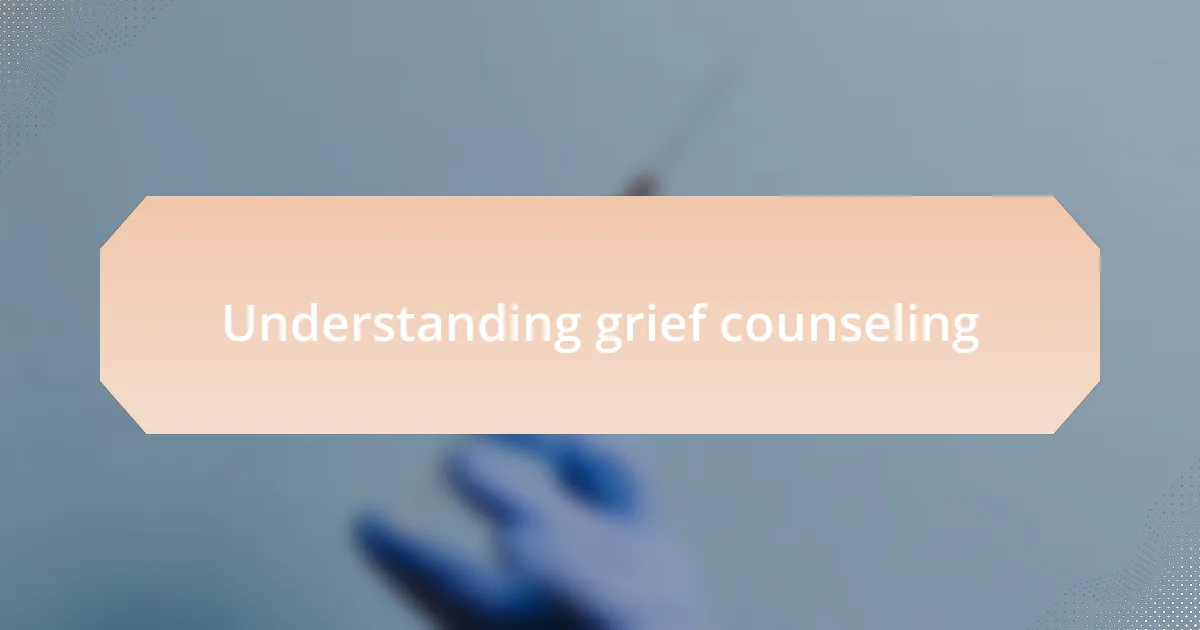
Understanding grief counseling
Grief counseling provides a safe space for individuals to process their feelings of loss, allowing them to express emotions that can often feel overwhelming. I recall attending one session where a participant shared how they felt guilt over not being able to say goodbye. It struck me how common this sentiment is; have you ever considered how often unresolved feelings cling to us in the aftermath of loss?
Counseling sessions focus on validating these emotions, helping individuals understand that grieving is not a linear process. I’ve seen firsthand how sharing stories, both painful and uplifting, fosters connection. Does the act of speaking about our grief somehow lighten its weight?
By navigating through different stages of grief—denial, anger, bargaining, depression, acceptance—clients gain valuable insights into their own emotional journey. In one session, a participant vividly described their anger, and it was a powerful reminder that anger is often a mask for deeper pain. How often do we overlook the complexity of our emotions in the pursuit of healing?
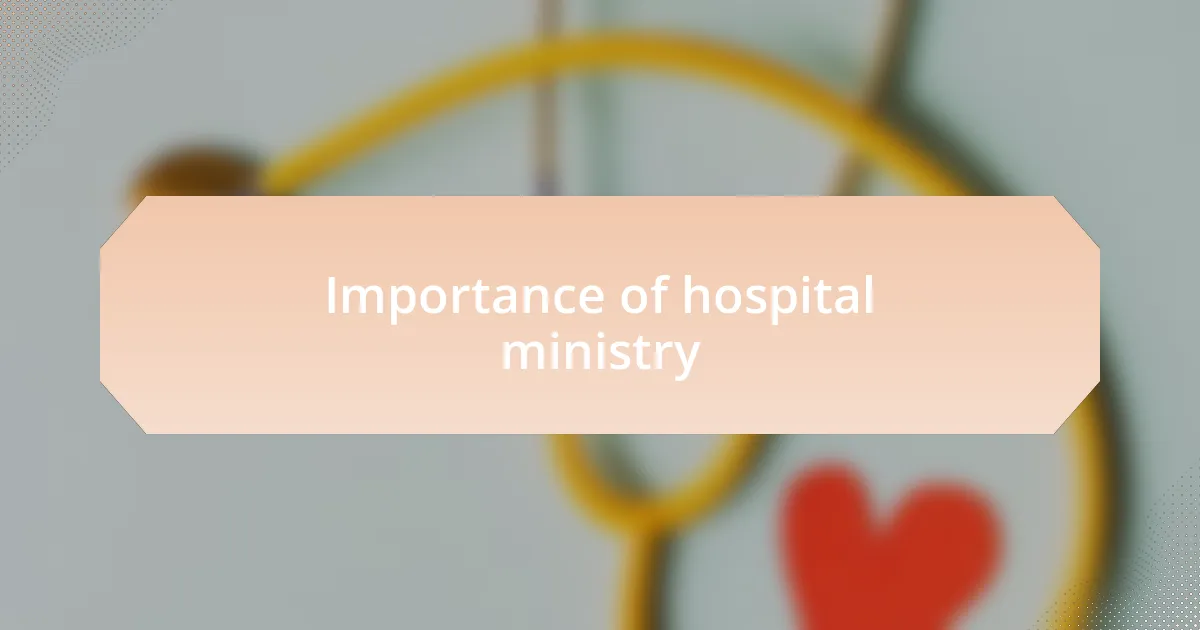
Importance of hospital ministry
The importance of hospital ministry cannot be underestimated, as it acts as a beacon of hope during some of life’s most challenging moments. I remember speaking with a nurse who shared how a simple visit from a chaplain made a world of difference for a grieving family. They found comfort in prayer and compassionate conversation, proving that even brief interactions can have profound effects on emotional well-being.
In my experience, hospital ministry serves as a vital support system that bridges the gap between medical care and emotional healing. One time, I witnessed a hospital chaplain facilitate a group session where participants shared their stories. The emotional release that ensued was palpable, highlighting how spiritual care complements traditional healthcare and nurtures a sense of belonging.
Moreover, hospital ministry provides an avenue for families to find meaning amidst chaos. During a particularly distressing time in the ICU, I encountered loved ones grappling with the unknown. A chaplain’s presence not only offered solace but also sparked meaningful conversations about life, death, and hope. Have you thought about how these spiritual connections can transform the hospital experience from one of fear to one of profound understanding?
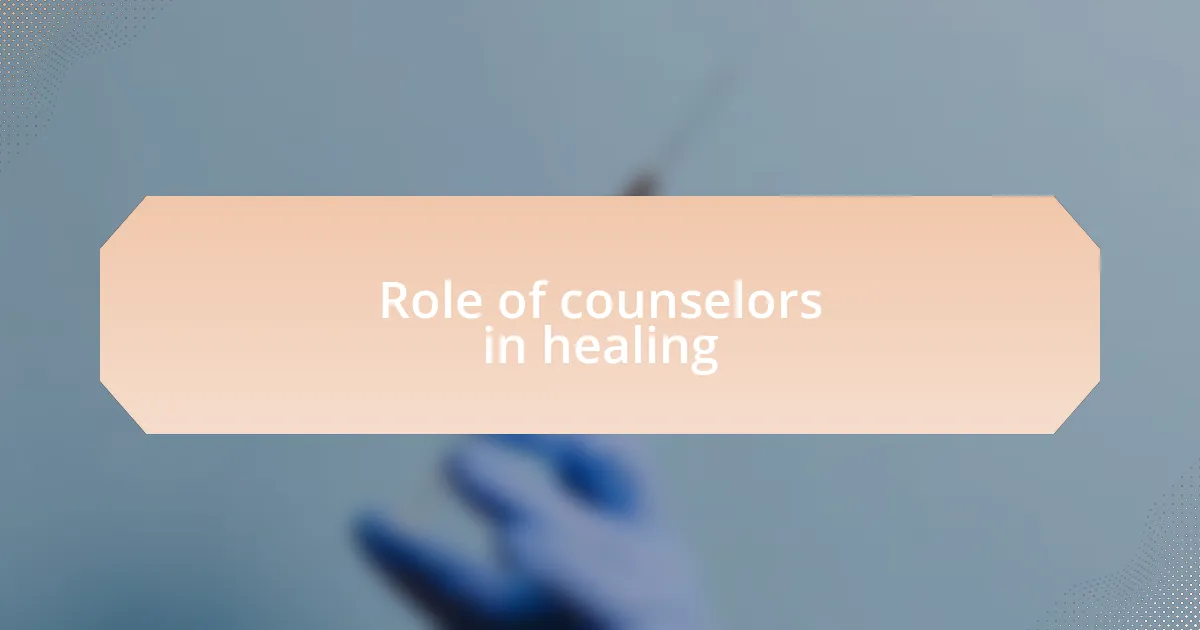
Role of counselors in healing
The role of counselors in healing goes beyond just listening; they help individuals process their grief in a safe environment. I recall a moment during a counseling session where a grieving mother shared her feelings of guilt and anger over her loss. The counselor skillfully guided her through these emotions, helping her to recognize that it was okay to feel this way and that these feelings were part of her healing journey.
Counselors also offer tools and strategies for coping that can feel invaluable during the grieving process. I once participated in a workshop led by a grief counselor who introduced mindfulness techniques. These practices helped me develop a deeper awareness of my emotions, which made it easier to navigate the turbulent waters of grief. Isn’t it fascinating how these practical skills can empower individuals to manage their feelings?
In addition to emotional support, counselors create a sense of community among those experiencing similar losses. I’ve seen how group sessions foster connections that are often hard to find elsewhere. Participants share their stories, and suddenly, no one feels alone in their grief. It makes you wonder—how much more healing can happen when we realize we don’t have to carry our burdens in silence?
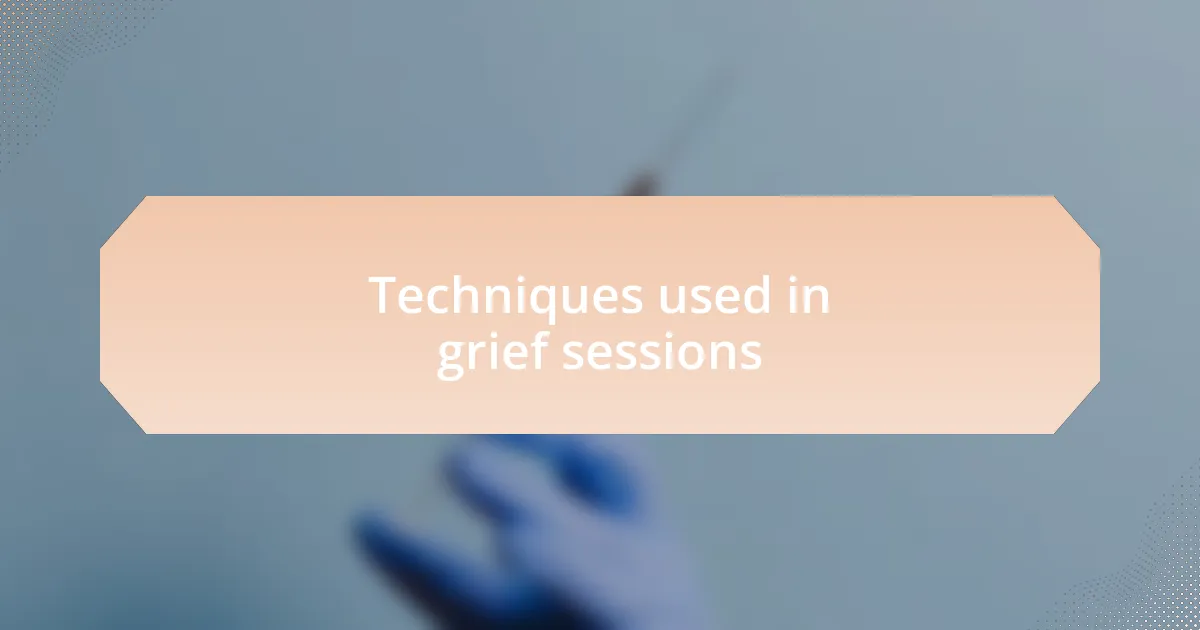
Techniques used in grief sessions
Grief sessions often incorporate guided imagery, which I find to be a powerful technique. In one session, I was led through a visualization exercise that took me to a serene beach. This vivid imagery helped me access deeper feelings and memories tied to my loss, creating a safe space to explore my emotions. Have you ever noticed how a simple image can evoke such strong feelings?
Another frequent technique involves journaling, which I personally discovered as a beneficial outlet. Writing down my thoughts and feelings allowed me to articulate grief I often struggled to express verbally. I still remember one night, pen in hand, when I uncovered layers of sorrow that surprised me. Is it possible that putting pen to paper could unlock our grief’s complexities in a way that speaking sometimes can’t?
Lastly, I’ve witnessed the use of role-playing in some sessions, where individuals enact scenarios related to their loss. This immersive approach can be incredibly revealing. I once participated in an exercise where I had to have a conversation with my late loved one. The experience was bittersweet but ultimately cathartic, as it allowed me to say what I hadn’t before. Could facing our feelings in such a candid way bring about healing that surprises us?
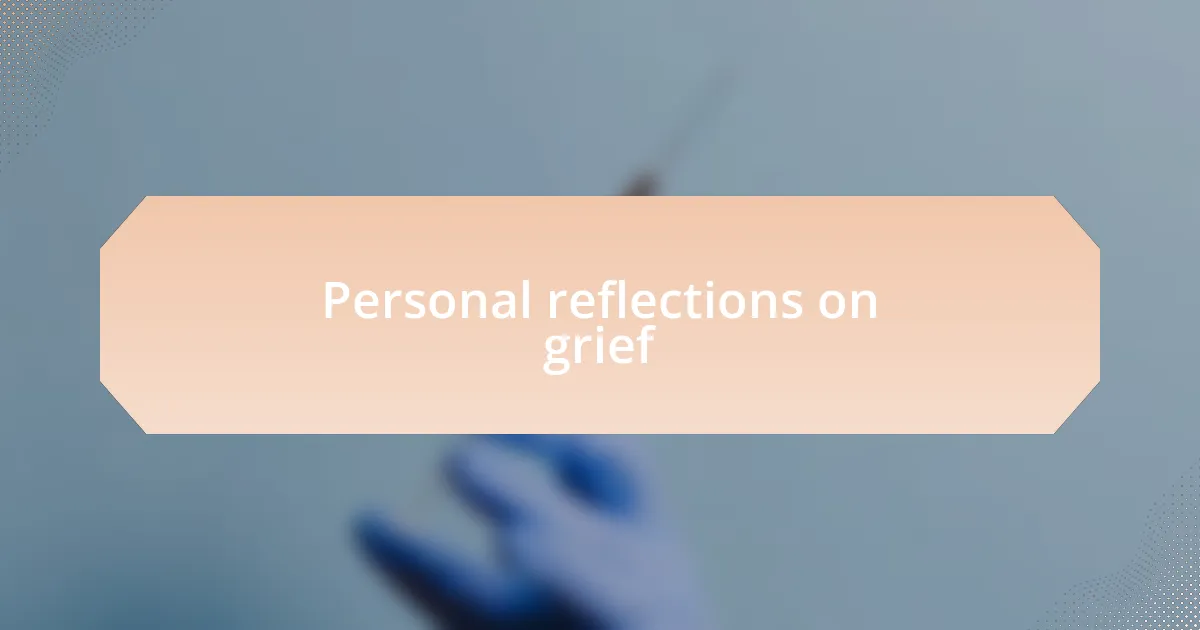
Personal reflections on grief
Grief often feels like an uninvited guest that shows up and refuses to leave. I remember sitting in a session, reflecting on the sudden loss of my friend, and realizing that the weight of my sorrow wasn’t just sadness—it was a complex mix of anger, confusion, and longing. It struck me how grief can shape our daily lives, sometimes creeping in when we least expect it, like a haunting melody reminding us of what we’ve lost.
During one particularly poignant moment, I shared a memory about a time we laughed together, and it hit me how intertwined joy and grief can be. As I recounted that story, I felt a warmth amidst the sadness, a reminder that the love we shared extends beyond loss. Have you ever noticed how reminiscing about a cherished moment can bring forth both a smile and a tear? It’s in these reflections that I find the courage to embrace my grief rather than fear it.
I’ve come to understand grief as a journey rather than a destination—one that we traverse in our own unique ways. There have been days when the pain felt overwhelming, but other days, small sparks of hope emerged, reminding me that healing doesn’t mean forgetting. It’s a gentle reminder that while grief can shape our lives, it does not define them. Have you ever felt that paradox, where the very act of remembering enhances both the sorrow and the love?
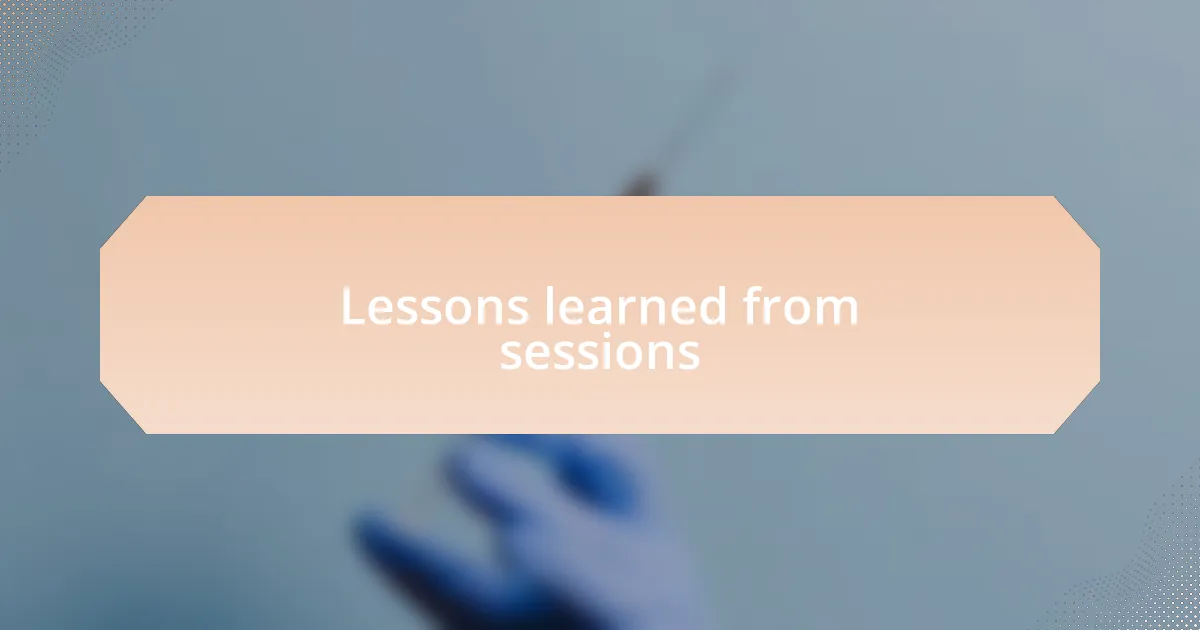
Lessons learned from sessions
In one of my sessions, I learned the importance of recognizing and honoring my grief instead of suppressing it. A fellow participant shared how they lit a candle each week in memory of their loved one, turning their grief into a ritual of remembrance. This inspired me to create my own meaningful practices, such as journaling my feelings or planting flowers in their honor. Have you ever thought about how little personal rituals could give your grief a tangible form?
Another lesson that resonated with me was the power of vulnerability within the group. I remember a moment when someone bravely voiced their fear of forgetting their loved one’s voice. In that instant, I realized how sharing our deepest fears can forge connections and foster understanding. This shared vulnerability allowed me to confront my own apprehensions about losing memories. Have you ever experienced that moment when someone else’s fear mirrors your own, making you feel less isolated in your grief?
Finally, I discovered that it’s okay to seek joy amidst sorrow. During one session, we discussed the idea of allowing ourselves to smile again, even while grieving. I shared a recent experience where I found joy in a family gathering, which initially made me feel guilty, as if I were betraying my lost one. Reflecting on this helped me understand that joy and grief can coexist; they aren’t mutually exclusive. Have you ever felt the guilt of laughter while still holding onto your sorrow?
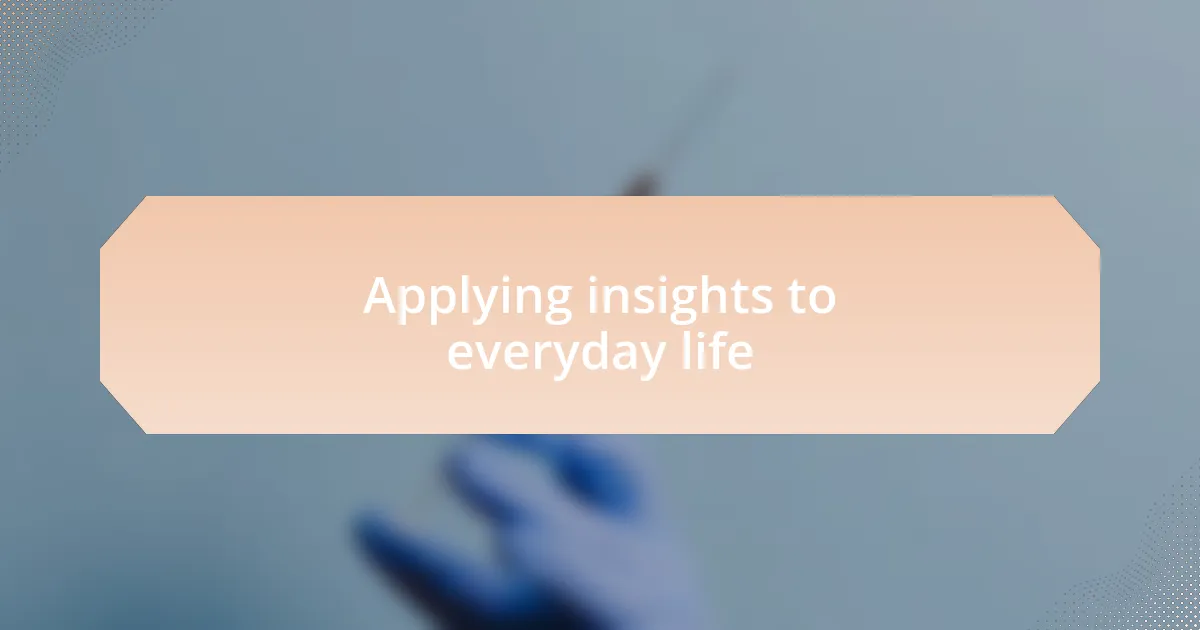
Applying insights to everyday life
In my daily life, I began to implement small rituals that helped me honor my grief. For instance, I set aside a few minutes each day to reflect on cherished memories with my loved one. This simple practice has transformed how I experience grief, providing a comforting space for my emotions and allowing me to carry their memory with me in a positive light. Have you considered how daily moments of reflection might influence your emotional journey?
I also noticed that being open with friends and family about my feelings can create deeper connections. Recently, I shared my experiences from grief counseling with a close friend, and what surprised me was how it encouraged them to open up about their own experiences with loss. This exchange reminded me that vulnerability cultivates empathy, creating a supportive network where we can lean on each other. Have you thought about how sharing your story might inspire others to share theirs?
Joy, I realized, is not an enemy of grief but rather a companion. Allowing myself to enjoy a favorite pastime, like painting or hiking, felt like a rebellion at first. Yet, as I made space for joy, it became an affirmation of life, a way to celebrate what was and is still meaningful. How could embracing moments of happiness enhance your journey through grief?